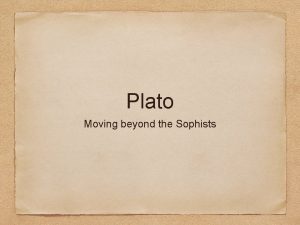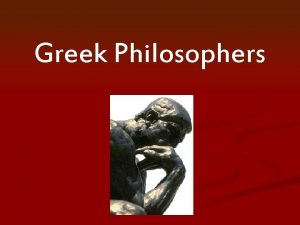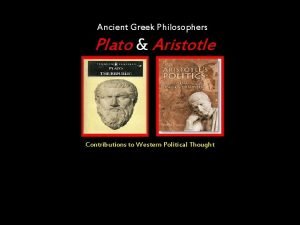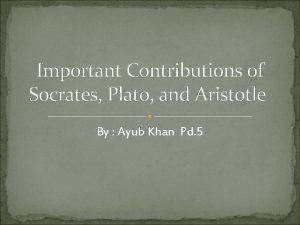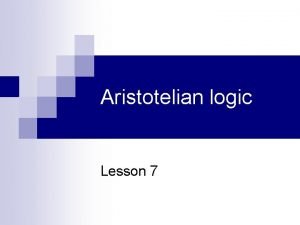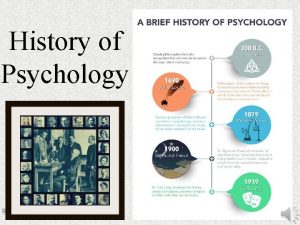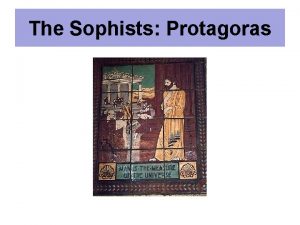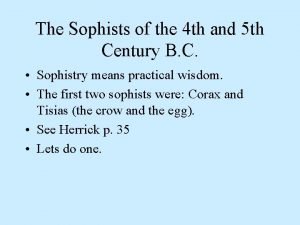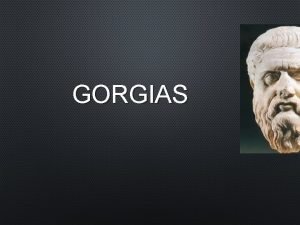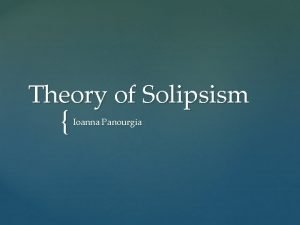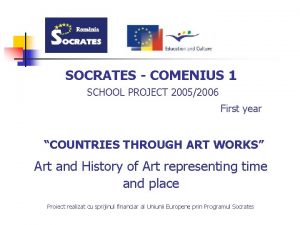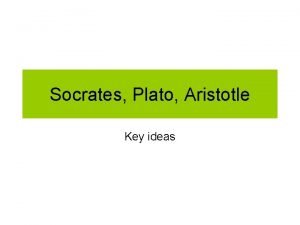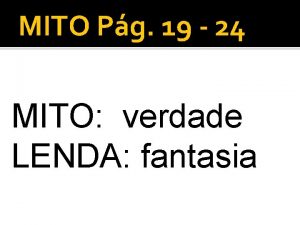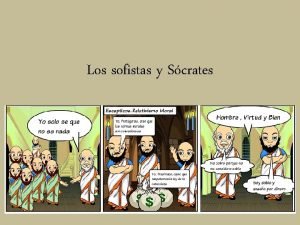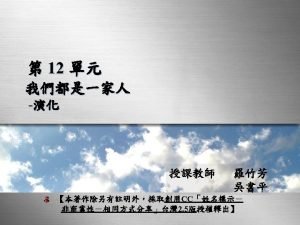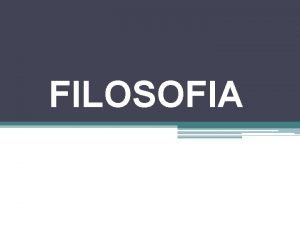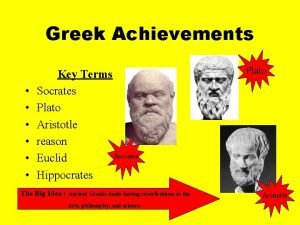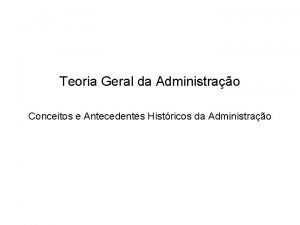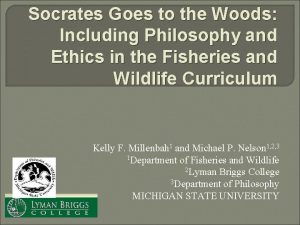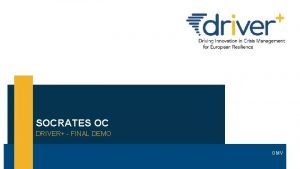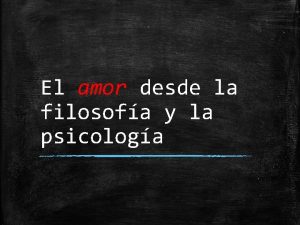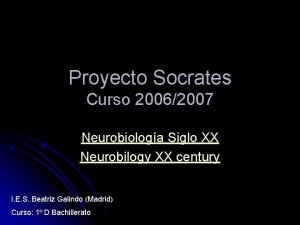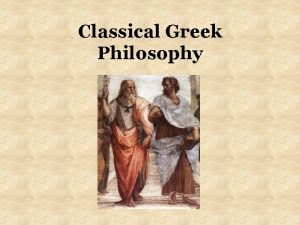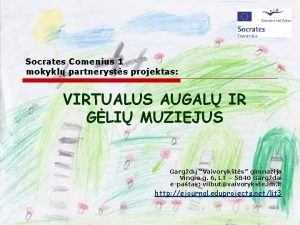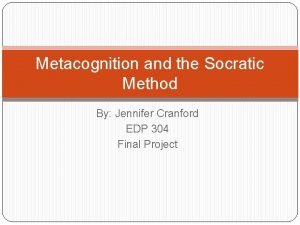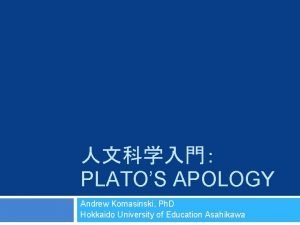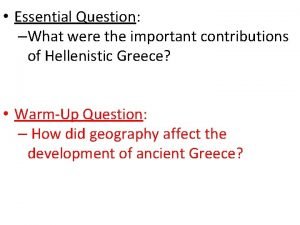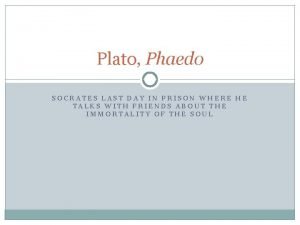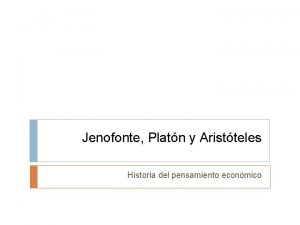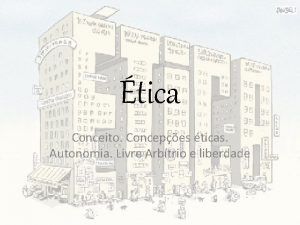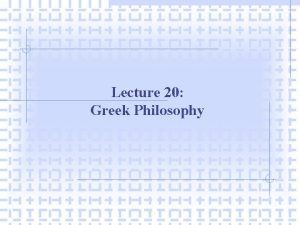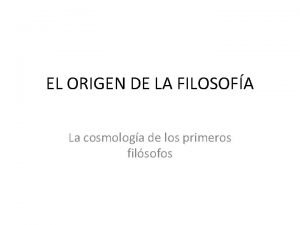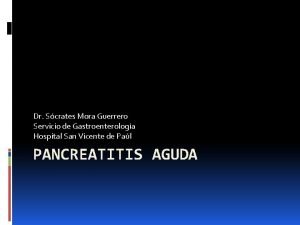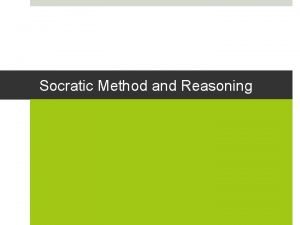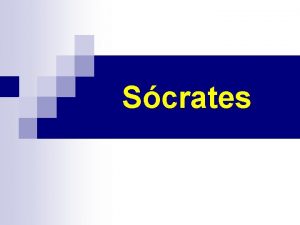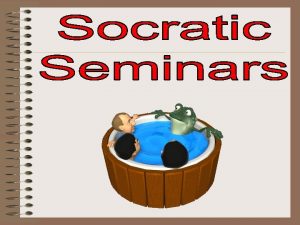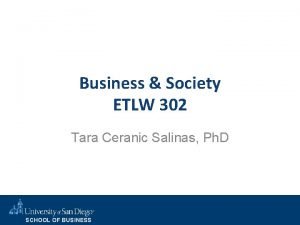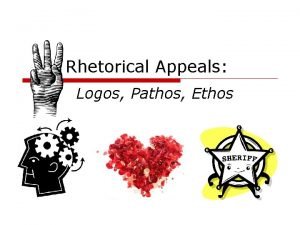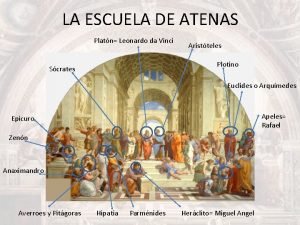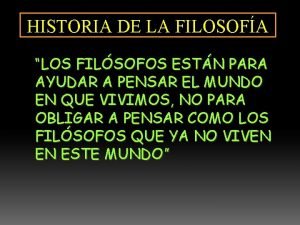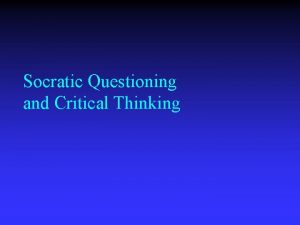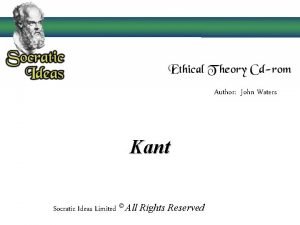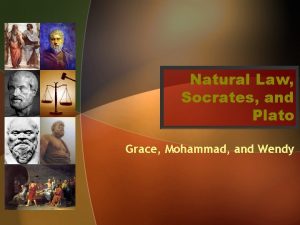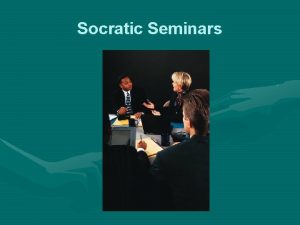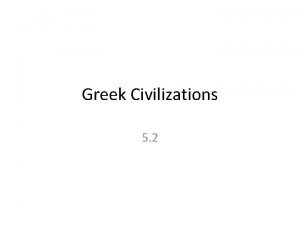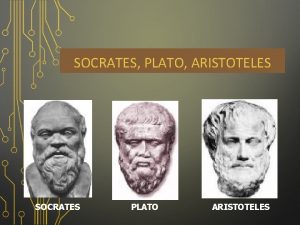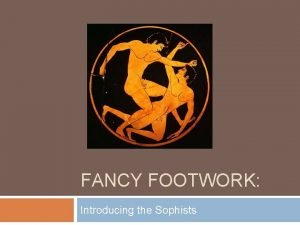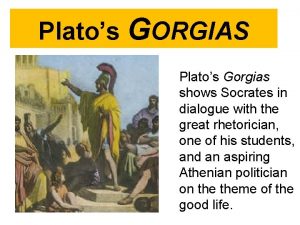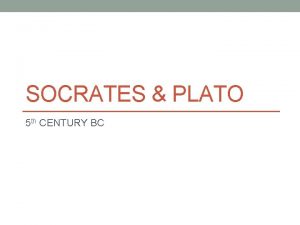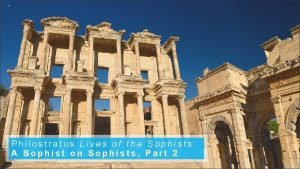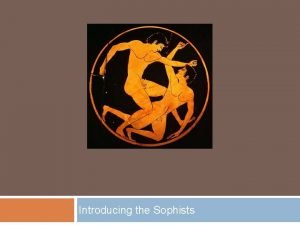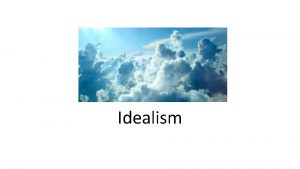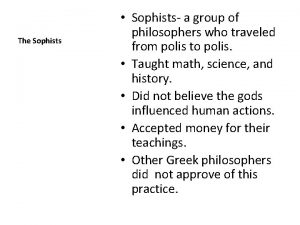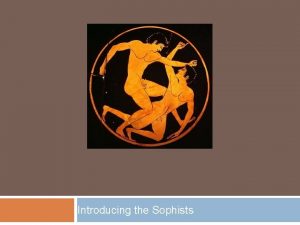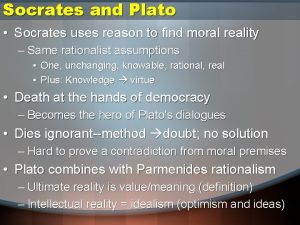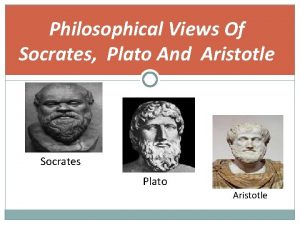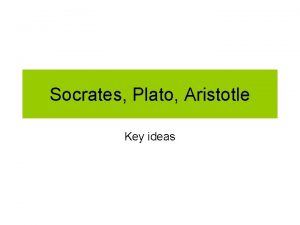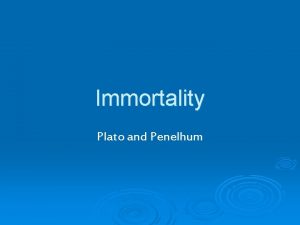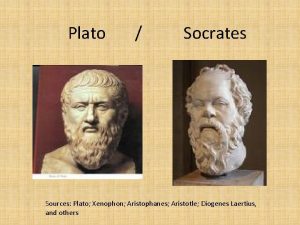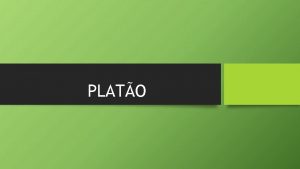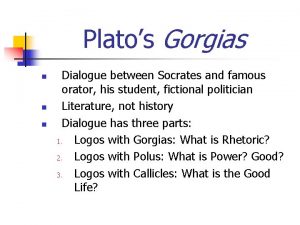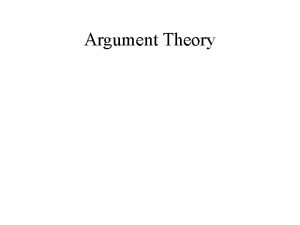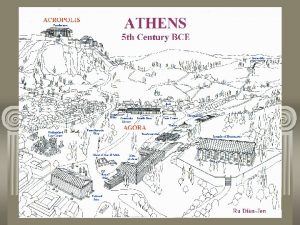Socrates Plato The Sophist The Sophists Protagoras Gorgias























































- Slides: 55

Socrates, Plato & The Sophist

The Sophists • • • Protagoras Gorgias Thrasymachus Argued that truth was relative. Taught rhetoric, the art of persuasion, regardless of the truth.

Protagoras • Man is the measure of all things. Of the things that are, that they are, of the things that are not, that they are not.

Relativism • Protagoras is a relativist about knowledge. • The question is what type of relativist? Is knowledge relative to the: Individual Culture Species

Protagoras regarding God • About the gods, I am not able to know whether they exist or do not exist, nor what they are like in form; for the factors preventing knowledge are many; the obscurity of the subject, and the shortness of human life. • Agnostic- undecided about god’s existence.

Views on God • Agnostic- undecided about god’s existence. • Atheist- God does not exist. • Theist- God exist

Gorgias • 1) That nothing exist • 2) That if anything does exist, it is incomprehensible • 3) That even if it is comprehensible, it cannot be communicated.

Can’t express knowledge • If reality is comprehensible, it cannot be accurately communicated. • He claimed that we communicate with words, • Words are only symbols or signs, • Symbols can never be the same as the thing they represent. • For this reason knowledge cannot be adequately communicated.

Impossible to Express • 1) People communicate with words • 2) Words are (symbols, signs, sounds) • 3) Words are not the same as the thing they represent • 4) Our ideas are not the same as words. • 5) For this reason knowledge (our ideas) cannot be adequately communicated with words.

Skepticism • The idea that we do not have knowledge. • Gorgias’ skepticism lead him to the study and teaching of rhetoric.

Thrasymachus • Thra-sym-achus • Injustice Pays! • Justice is for the ignorant.

Thrasymachus • The wise pursue their own interest at the expense of others. • Might = Right. • A view echoed by Thomas Hobbes and Nietzsche.

Socrates (469 -399 BC) • Socrates asked probing questions of the intellectual elite in Athens.

Socrates (469 -399 BC) • All sources agree that Socrates was exceedingly ugly, had an unorthodox (lowly) manner of dress, and often wandered around barefooted.

The Oracle of Delphi • Declared by the Oracle at Delphi to be the Wisest of men- he said he was wise because he admitted his ignorance!

Dialogues or plays • Socrates taught orally and did not put his doctrines into writing. • He did not write books. His student, Plato, wrote dialogues that reflect his views. • These are accounts of debates.

Not a Sophist • Unlike the Sophists (who were paid for teaching wealthy aristocrats the skills of oration and persuasive argument) • Socrates charged no fees and taught students (including women) from various walks of life.

Socratic Method The Socratic Method is used to arrive at truth- The Essential Nature of Things. Also known as dialectic method, it is where you continue to question something until you arrive at a definition of the thing in question. (If that is possible)

Socrates and his Student Plato

The Trial of Socrates 399 B. C. • Socrates was accused of Impiety- (refusing to acknowledge the gods recognized by the State ) • & Corrupting the young. • Jury of 500 Found Socrates Guilty. • Sentenced to Death… Could have escaped into exile. Choose to accept death sentence.

Socrates was found guilty by a jury of 500, sentenced to Death!

Plato 428 -384 B. C. • Plato, the student of Socrates, founded the first University in the year 387 called the Academy. • Science and knowledge were the chief goals of study. • The mind was trained to cut thru rhetoric.

Plato’s Philosophy • Theory of Forms – Allegory of the Cave – Divided Line – Platonic Forms – Platonic Realism – Division of the Soul – Philosopher King – Memories of the Soul

Allegory of the Cave • Plato ask us to imagine… • …that men believe the shadows are real. • This is told in class, and it is told well. • Page 40 in Book.

Plato on knowledge • Plato thinks that because this world is constantly changing, that truth is this world is impossible. • Truth for Plato is something, eternal. • Objects in this world are not eternal, so are beliefs about them cannot always be correct.

Divided Line (p. 51) Intelligible World FORMS Knowledge Truth/ Knowledge Intelligible World Visible World Numbers & Thinking Sets Physical Belief Objects Truth/ Knowledge Opinion Visible World Images, copies of objects Opinion or Imagining

Platonic Forms • PLATONIC FORMS: • • • UNIVERSAL IDEAS OR CONCEPTS ETERNAL CHANGLESS TIMELESS NON-MATERIAL ESSENCES

Platonic Forms Continued • All physical objects are copies of these original entities • They exist in another plain of realityin an immaterial realm.

Modes of Thought Knowledge Thinking Belief Imagining

Imagining • Imagining is the lowest form of knowledge. • It is the lowest because the mind does not know it is just an image- it thinks the image is real (as in the CAVE) • An Imagine is an imperfect copy of a physical object. As such it is lower on the scale of knowledge than the physical thing.

Belief • A belief is held about some physical object. • Physical objects do not correspond to the “true” or “real” Form that they copy. • Beliefs about physical objects are not certain, because the objects and world are in a state of changing. • Physical objects are not eternal.

Thinking • Thinking is a deeper level of understanding. • One moves from the visible world, to the intelligible world of thought. • The objects of mathematics, such as numbers, sets, geometric figures and formula make up this level of knowledge.

Knowledge • Perfect Intelligence- Knowledge of the Forms. • At this level of understanding the mind grasp the unity of reality, and the truth that the ideas or Forms are what really exist!

Platonic Forms • Plato claimed that all physical objects copy the original, unchanging Form. • Physical objects are imperfect copies. • Like Heraclitus, he held that this reality is constantly changing and shifting. • What is true today may be false tomorrow in this world. • In the realm of the Forms- truth is eternal.

How are Forms related to one another. • Forms are related to one another. • For Example: – Form Animal – Form Horse Particular Horse Form Shape Form Circle Particular circle

How are Forms related to Particulars • Particulars- or Particular objects, partake of the Form. • Socrates partakes in the Form Man • The clock partakes in circle, clock, numbers… • How specific we need to get is a question.

Platonic Realism • The notion that Forms or Ideas exist in a separate reality is known as Platonic Realism.

Universals and Particulars. • This is an issue in metaphysics • What is the relationship between ideas and objects. • Universals is another name for ideas or concepts. (General terms) • Particulars is another name for objects or individual things that we encounter in the world.

Ontological Status of Ideas • • Platonic Realism Exaggerated Realism Conceptualism Extreme Nominalism

Platonic Realism • Ideas are real. They have independent existence, apart from our thoughts. • For Plato Universals have Transcendental existence apart from the particulars that participate. The Form is the cause of the essence of a thing, and the particulars are said to imitate or copy the Forms in an imperfect way.

Exaggerated Realism • Exaggerated Realism is the notion that Universals exist in the particulars as part of what makes them similar. • The particulars are a mix or composite of form and matter.

Aristotle’s Exaggerated Realism • Aristotle did not accept Plato’s claim that there was a separate realm, or heaven of Forms. • Aristotle claimed that forms were real, but existed in the objects that we perceive and in our minds.

St. Anselm’s Exaggerated Realism • St. Anselm argued that the doctrine of original sin and of the Trinity required this interpretation of what ideas are.

Conceptualism • All ideas are real, but the are dependent upon a mind, or thought. • The function of a universal term is to denote a special relationship between particular objects. Universal are object concepts that we form in our minds by examining particulars.

Extreme Nominalism • Ideas are not real objects. They do not have real existence. • Only particulars or individuals exist in nature. A general term, a universal, such as a word does not refer to anything; it is only a word (voces), or a name (nomen), composed of letters and expressed as a vocal emission and is therefore only air. •

How do we know the Forms • Why should we accept that there is a separate reality filled with ideas? • Plato claims that he remembers the Forms. • According to Plato our Soul is eternal, and once existed in the realm of the Forms.

Memories of the Soul • According to Plato our soul is eternal. It comes from the realm of the Forms and is infused with the body during pregnancy. • All of us had complete access to all the Forms • We all have within our soul, absolute knowledge.

Division of the Soul • According to Plato the soul is divided into three parts. • Tripartite conception of the soul. • Reason • Spirit • Appetite

Reason • Reason guides us rationally towards reasonable goals

Spirit • Spirit gives us the ability to comply with reason, to be brave and follow thru with our goals

Appetite • The appetitive side of our soul drives our impulses and desires. • Reason, according to Plato, must keep the desires in check. • Allowing our passions to make decision will lead to chaos and ruin.

Plato and ignorance • Ignorance leads to evil. • Plato claims that no one knowingly does wrong. • Akrasia- or weakness of the will, does not exist. • People simply do not understand the harm they are doing by performing certain actions.

Philosopher King • Plato argued that society should be ordered like the soul. • Reason- Philosopher King • Spirit- Auxiliaries or Soldiers • Appetites- workers/ artisans

Plato’s Ideal Society • Plato’s ideal society is an intellectual Aristocracy. • Smart people deciding for everyone the right and the good. • Because smart people have a true grasp of the world.

Ranking of Social Structures • Plato thought an intellectual aristocracy was the best form of government. • He held that a democracy was the worst.
 Sophists philosophy
Sophists philosophy Sophists are lovers of wisdom.
Sophists are lovers of wisdom. Socrates plato and aristotle worksheet answer key
Socrates plato and aristotle worksheet answer key Socrates contributions
Socrates contributions Socrates and plato similarities
Socrates and plato similarities Structuralism vs functionalism
Structuralism vs functionalism Protagoras
Protagoras Plato beliefs
Plato beliefs Protgoras
Protgoras Gorgias nothing exists
Gorgias nothing exists Gorgias
Gorgias Gorgias helen of troy
Gorgias helen of troy Gorgias solipsism
Gorgias solipsism Haemotypsis
Haemotypsis Socrates comenius
Socrates comenius Socrates key ideas
Socrates key ideas Pain scale examples
Pain scale examples Socrates 469-399 bce
Socrates 469-399 bce O que é maiêutica
O que é maiêutica En que consiste el intelectualismo moral de socrates
En que consiste el intelectualismo moral de socrates Lysippos
Lysippos Loess school
Loess school Maiêutica
Maiêutica Achievements of socrates
Achievements of socrates Sócrates platão e aristóteles
Sócrates platão e aristóteles Socrates principles
Socrates principles Socrates demo
Socrates demo El amor según sócrates
El amor según sócrates Proyecto socrates
Proyecto socrates Socrates' philosophy
Socrates' philosophy Socrates comenius
Socrates comenius Socratic method
Socratic method Lodcraft
Lodcraft Socratic method
Socratic method Socrates contribution to philosophy
Socrates contribution to philosophy Socrates response to cebes
Socrates response to cebes Jenofonte
Jenofonte ética em sócrates
ética em sócrates Socrates' philosophy
Socrates' philosophy Filosofía presocrática características
Filosofía presocrática características Asa centinela rx
Asa centinela rx Socratic method of teaching
Socratic method of teaching Socrates intranet
Socrates intranet Quem foi sócrates
Quem foi sócrates Socrates believed that students should
Socrates believed that students should Socrates letter from birmingham jail
Socrates letter from birmingham jail Etlw
Etlw Ethos rhetoric
Ethos rhetoric Arquimedes
Arquimedes Anaximenes arje
Anaximenes arje Critical thinking is driven by
Critical thinking is driven by Socrates on freedom
Socrates on freedom Socrates natural law
Socrates natural law O que sócrates fazia
O que sócrates fazia Define socratic seminar
Define socratic seminar Athenian sculptor whose true love was philosophy
Athenian sculptor whose true love was philosophy
